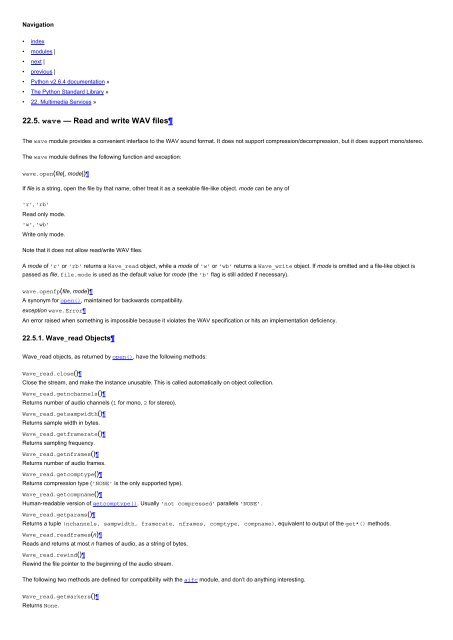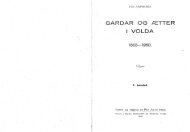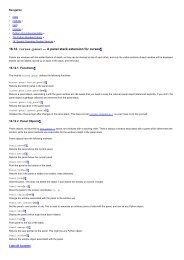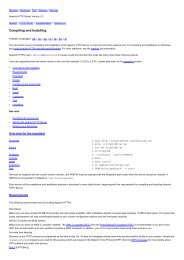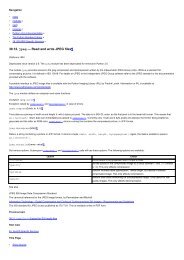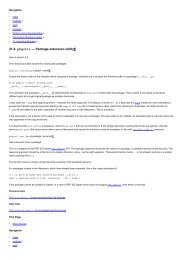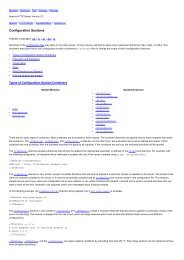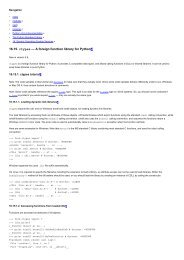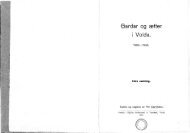Python v2.6.4 documentation
Python v2.6.4 documentation
Python v2.6.4 documentation
Create successful ePaper yourself
Turn your PDF publications into a flip-book with our unique Google optimized e-Paper software.
Navigation<br />
• index<br />
• modules |<br />
• next |<br />
• previous |<br />
• <strong>Python</strong> <strong>v2.6.4</strong> <strong>documentation</strong> »<br />
• The <strong>Python</strong> Standard Library »<br />
• 22. Multimedia Services »<br />
22.5. wave — Read and write WAV files<br />
The wave module provides a convenient interface to the WAV sound format. It does not support compression/decompression, but it does support mono/stereo.<br />
The wave module defines the following function and exception:<br />
wave.open(file[, mode])<br />
If file is a string, open the file by that name, other treat it as a seekable file-like object. mode can be any of<br />
'r', 'rb'<br />
Read only mode.<br />
'w', 'wb'<br />
Write only mode.<br />
Note that it does not allow read/write WAV files.<br />
A mode of 'r' or 'rb' returns a Wave_read object, while a mode of 'w' or 'wb' returns a Wave_write object. If mode is omitted and a file-like object is<br />
passed as file, file.mode is used as the default value for mode (the 'b' flag is still added if necessary).<br />
wave.openfp(file, mode)<br />
A synonym for open(), maintained for backwards compatibility.<br />
exception wave.Error<br />
An error raised when something is impossible because it violates the WAV specification or hits an implementation deficiency.<br />
22.5.1. Wave_read Objects<br />
Wave_read objects, as returned by open(), have the following methods:<br />
Wave_read.close()<br />
Close the stream, and make the instance unusable. This is called automatically on object collection.<br />
Wave_read.getnchannels()<br />
Returns number of audio channels (1 for mono, 2 for stereo).<br />
Wave_read.getsampwidth()<br />
Returns sample width in bytes.<br />
Wave_read.getframerate()<br />
Returns sampling frequency.<br />
Wave_read.getnframes()<br />
Returns number of audio frames.<br />
Wave_read.getcomptype()<br />
Returns compression type ('NONE' is the only supported type).<br />
Wave_read.getcompname()<br />
Human-readable version of getcomptype(). Usually 'not compressed' parallels 'NONE'.<br />
Wave_read.getparams()<br />
Returns a tuple (nchannels, sampwidth, framerate, nframes, comptype, compname), equivalent to output of the get*() methods.<br />
Wave_read.readframes(n)<br />
Reads and returns at most n frames of audio, as a string of bytes.<br />
Wave_read.rewind()<br />
Rewind the file pointer to the beginning of the audio stream.<br />
The following two methods are defined for compatibility with the aifc module, and don’t do anything interesting.<br />
Wave_read.getmarkers()<br />
Returns None.
Wave_read.getmark(id)<br />
Raise an error.<br />
The following two methods define a term “position” which is compatible between them, and is otherwise implementation dependent.<br />
Wave_read.setpos(pos)<br />
Set the file pointer to the specified position.<br />
Wave_read.tell()<br />
Return current file pointer position.<br />
22.5.2. Wave_write Objects<br />
Wave_write objects, as returned by open(), have the following methods:<br />
Wave_write.close()<br />
Make sure nframes is correct, and close the file. This method is called upon deletion.<br />
Wave_write.setnchannels(n)<br />
Set the number of channels.<br />
Wave_write.setsampwidth(n)<br />
Set the sample width to n bytes.<br />
Wave_write.setframerate(n)<br />
Set the frame rate to n.<br />
Wave_write.setnframes(n)<br />
Set the number of frames to n. This will be changed later if more frames are written.<br />
Wave_write.setcomptype(type, name)<br />
Set the compression type and description. At the moment, only compression type NONE is supported, meaning no compression.<br />
Wave_write.setparams(tuple)<br />
The tuple should be (nchannels, sampwidth, framerate, nframes, comptype, compname), with values valid for the set*() methods. Sets all<br />
parameters.<br />
Wave_write.tell()<br />
Return current position in the file, with the same disclaimer for the Wave_read.tell() and Wave_read.setpos() methods.<br />
Wave_write.writeframesraw(data)<br />
Write audio frames, without correcting nframes.<br />
Wave_write.writeframes(data)<br />
Write audio frames and make sure nframes is correct.<br />
Note that it is invalid to set any parameters after calling writeframes() or writeframesraw(), and any attempt to do so will raise wave.Error.<br />
Table Of Contents<br />
22.5. wave — Read and write WAV files<br />
• 22.5.1. Wave_read Objects<br />
• 22.5.2. Wave_write Objects<br />
Previous topic<br />
22.4. sunau — Read and write Sun AU files<br />
Next topic<br />
22.6. chunk — Read IFF chunked data<br />
This Page<br />
• Show Source<br />
Navigation<br />
• index<br />
• modules |<br />
• next |<br />
• previous |<br />
• <strong>Python</strong> <strong>v2.6.4</strong> <strong>documentation</strong> »<br />
• The <strong>Python</strong> Standard Library »<br />
• 22. Multimedia Services »
© Copyright 1990-2010, <strong>Python</strong> Software Foundation.<br />
The <strong>Python</strong> Software Foundation is a non-profit corporation. Please donate.<br />
Last updated on Feb 26, 2010. Created using Sphinx 0.6.3.


